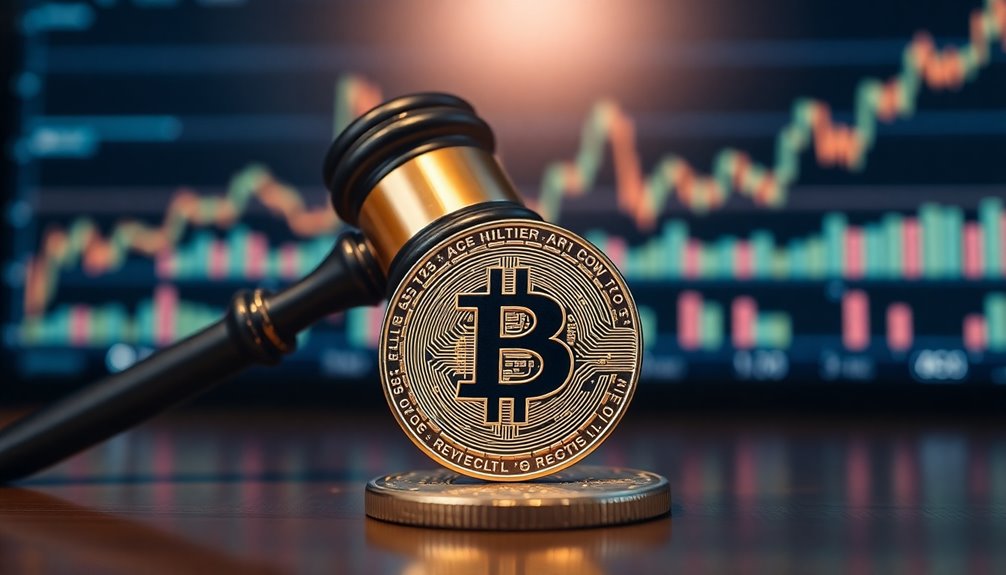Trump's crypto deregulation plan aims to simplify regulations for cryptocurrencies, potentially allowing banks to provide custody services and shifting oversight from the SEC to the CFTC. This could enhance market participation and spur innovation, but it also raises concerns about reduced oversight, risking market volatility and investor confidence. As deregulation unfolds, you might notice increased speculative activities, making it crucial to assess the associated risks. Balancing market growth with necessary safeguards is essential to protect investors. If you're curious about the ramifications and strategies involved, there's more to explore in this evolving landscape.
Key Takeaways
- Trump's crypto deregulation plan aims to simplify bank custody of cryptocurrencies, potentially enhancing market participation and innovation in the digital asset space.
- The plan may shift oversight from the SEC to the CFTC, providing clearer regulatory guidance for cryptocurrency transactions and services.
- Establishing a Bitcoin and Crypto Presidential Advisory Council could improve regulatory frameworks and consumer protections in the evolving crypto landscape.
- While deregulation may boost market optimism, it raises concerns about increased fraud, market volatility, and reduced investor confidence due to weakened oversight.
- Continuous risk assessment and management strategies will be essential to address market volatility and safeguard investor interests in a deregulated environment.
Crypto Deregulation Overview

As the U.S. considers a shift toward crypto deregulation, it's crucial to understand the potential changes on the horizon.
Revisiting the 2020 OCC guidance could simplify banks' ability to custody cryptocurrencies, lowering entry barriers for traditional institutions. Currently, about 15% of Americans own cryptocurrencies, indicating a growing interest in digital assets.
Expanding the Community Reinvestment Act to include crypto investments may encourage banks to back blockchain projects in underserved areas.
Additionally, reducing the regulatory load by streamlining oversight could foster a more welcoming environment for digital assets.
Merging bank deposit insurance with the Treasury could further clarify regulatory frameworks.
Background on Crypto Regulations

Understanding the current landscape of crypto regulations is vital as the U.S. moves toward potential deregulation. The regulatory framework is complex, involving both state-specific laws and federal oversight from agencies like the SEC and CFTC. For instance, states like Georgia require cryptocurrency platforms to obtain licenses for money transmission. As regulations evolve, new proposals aim to clarify jurisdiction and enhance consumer protections, addressing challenges such as fraud and financial crimes. Licensing is required for money transmission activities, including cryptocurrency, in several states, which underscores the importance of compliance for businesses operating in this sector. Regulatory bodies have actively enforced compliance, issuing Cease and Desist Orders against unlicensed platforms. The intricacies of crypto transactions often create gaps in oversight, highlighting the need for clearer definitions and compliance strategies for companies operating in this rapidly changing environment.
Mechanisms of Regulatory Change

While the landscape of cryptocurrency regulation continues to evolve, several mechanisms are emerging that could significantly reshape the framework governing digital assets.
First, the OCC might reissue its 2020 guidance, allowing banks to offer crypto custody services, which lowers barriers for traditional banks and enhances security measures. This move aligns with the increasing demand for crypto-custodial services that safeguard assets against theft and loss.
Next, revising the Community Reinvestment Act could incentivize banks to invest in crypto projects, increasing financial inclusion in underserved areas.
Additionally, a shift in oversight from the SEC to the CFTC could provide clearer guidelines, boosting investor confidence.
Lastly, establishing a Bitcoin and Crypto Presidential Advisory Council would create a platform for strategic regulatory guidance, enabling informed decision-making in this rapidly changing landscape.
Pros and Cons of Deregulation

Deregulation of the cryptocurrency market presents a double-edged sword, offering both significant opportunities and notable risks.
On the one hand, it could lead to increased adoption, making it easier for banks to integrate crypto into their services and promoting financial inclusion through blockchain-based lending. A national Bitcoin reserve might further boost market optimism, especially as the proposal for a federal crypto reserve fund is valued at $100 billion.
On the other hand, deregulation raises concerns about financial volatility and instability, as weakened oversight could lead to compliance issues and money laundering risks. The potential for scams and market manipulation could undermine investor trust, while a lack of clarity might create a chaotic regulatory environment.
Ultimately, you'll need to weigh these pros and cons carefully as the landscape evolves.
Deregulation vs. Existing Regulations

As the cryptocurrency market continues to evolve, the tension between deregulation and existing regulations becomes increasingly apparent.
Currently, the regulatory landscape is fragmented, with various federal and state regulators having overlapping jurisdictions. The SEC plays a critical role, emphasizing consumer protections, but state and federal bodies are working to clarify regulations around licensing and fraud risks. Market volatility can significantly impact the pricing and investment behavior within the cryptocurrency space, making comprehensive regulations essential for stability.
In contrast, a Trump administration may advocate for a more relaxed regulatory environment, potentially shifting oversight to the CFTC and easing standards for tokenized assets. This shift could be influenced by the anticipated appointment of a more crypto-friendly SEC chair who might support relaxation of regulations.
While this could foster growth and position the U.S. as a crypto hub, it raises concerns about consumer protection and the risks of inadequate oversight in a rapidly changing market.
Market Volatility Concerns

The shift towards a more relaxed regulatory environment raises significant market volatility concerns.
Without stringent regulations, you might see an increase in speculative activity, leading to potential bubbles and crashes. Investing in unvetted digital assets becomes riskier, especially for those unfamiliar with the market. The inherent volatility of crypto could amplify, resulting in more frequent and severe price fluctuations. Furthermore, a shift of oversight from the SEC to the CFTC could leave investors vulnerable to unregulated practices and illicit activities. As retail investors flock to the market, their lack of understanding may exacerbate volatility, complicating your ability to navigate these turbulent waters effectively. This environment of increased risk is further underscored by the recent surge in cryptocurrency values, which has drawn attention from both new and seasoned investors alike.
Recent Market Reactions

While investors are buzzing with optimism following Trump's election victory, recent market reactions highlight a significant shift in the cryptocurrency landscape.
Bitcoin's price has surged past $100,000, driven by excitement over potential regulatory changes and the proposed U.S. Bitcoin strategic reserve. This enthusiasm extends to other cryptocurrencies, with Dogecoin seeing an 18% rise. Industry leaders are predicting unprecedented growth, as geopolitical tensions push countries like Russia to consider similar strategies. Furthermore, there's strong support for recognizing cryptocurrencies as commodities, which could foster a more favorable regulatory environment. As public support for Trump's pro-crypto stance grows, experts believe clearer regulations could stabilize the market and attract more American investors. Additionally, the balance between deregulation and financial safety will be crucial in shaping the future of the cryptocurrency market.
Risk Management Techniques

Navigating the volatile world of cryptocurrency requires a solid understanding of risk management techniques.
First, identify risks such as market volatility, liquidity, cybersecurity, regulatory changes, and operational issues. Then, analyze these risks using quantitative methods like stress testing and qualitative approaches like SWOT analysis.
Prioritize your findings with tools like a risk heat map, assessing the likelihood and impact of each risk. Risk identification is crucial as it ensures no significant risks are overlooked in the assessment process.
For treatment planning, consider strategies like risk avoidance by steering clear of high-risk assets, or risk reduction through diversification. You might also explore risk transfer options or accept certain risks while preparing mitigation plans.
Continuous monitoring is crucial; regularly update your assessments to adapt to the ever-changing crypto landscape.
Frequently Asked Questions
How Will Deregulation Affect Individual Crypto Investors?
Deregulation can significantly impact you as a crypto investor.
It might increase market volatility, making it tougher to navigate price swings and potentially leading to unvetted assets that pose risks.
While you could gain more flexibility and innovative investment opportunities, the lack of clear consumer protections may leave you vulnerable.
As regulations change, staying informed and cautious is essential to safeguard your investments against potential pitfalls in an increasingly unpredictable market.
What Industries Might Benefit From Trump's Deregulation Plan?
If you consider deregulation, several industries stand to gain.
The financial services sector might thrive as banks explore crypto custody, easing their entry into digital assets.
The energy sector could see a boost from reduced regulations on oil and gas, potentially increasing production and jobs.
Meanwhile, the tech industry might benefit from fewer operational constraints, though trade tensions could complicate matters.
Will Deregulation Impact International Crypto Markets?
Deregulation will likely impact international crypto markets significantly.
You'll see a more cohesive global regulatory framework develop as other nations may emulate this approach. This could enhance investor confidence and attract institutional investment, benefiting the overall market.
However, be aware of potential market volatility and ethical dilemmas that could arise.
As cryptocurrencies gain traction as stable alternatives in hyperinflationary economies, their global adoption is likely to accelerate, reshaping financial landscapes.
How Does Public Opinion Influence Crypto Deregulation Efforts?
Public opinion's influence on crypto deregulation is like a tidal wave crashing on the shores of legislation.
When nearly 81% of people want clearer regulations, it's clear you can't ignore their voices.
If candidates prioritize crypto policies, you might see a shift in the regulatory landscape.
Your concerns about instability and oversight reflect a growing demand for transparency, which can shape how lawmakers approach future crypto regulations.
What Are Potential Job Implications of Crypto Deregulation?
Crypto deregulation could create a mix of job opportunities and challenges for you.
On one hand, you'll see more startups and demand for blockchain expertise, which can enhance your career prospects.
On the other hand, traditional banking roles might dwindle due to competition and automation.
If you're in finance, you may need to upskill to stay relevant.
Conclusion
In the whirlwind of Trump’s crypto deregulation plan, you’re witnessing a potential seismic shift in the digital currency landscape. While it promises to unleash innovation and economic growth, it also invites a storm of volatility and risks. As you navigate these choppy waters, staying informed and using sound risk management techniques will be your lifebuoy. Ultimately, the future of crypto hangs in the balance, and your choices today could shape the market of tomorrow. Moreover, as regulators adapt to these changes, the landscape might become increasingly complex, requiring investors to remain vigilant. In a striking development, recent news has emerged that ‘US indicts three Russian individuals‘ for allegedly orchestrating a cybercrime campaign targeting U. S. financial institutions, further highlighting the intersection of security and crypto markets. As these events unfold, the importance of thorough research and an understanding of the geopolitical implications cannot be overstated, as they will play a crucial role in determining the stability and future of the digital currency ecosystem.









